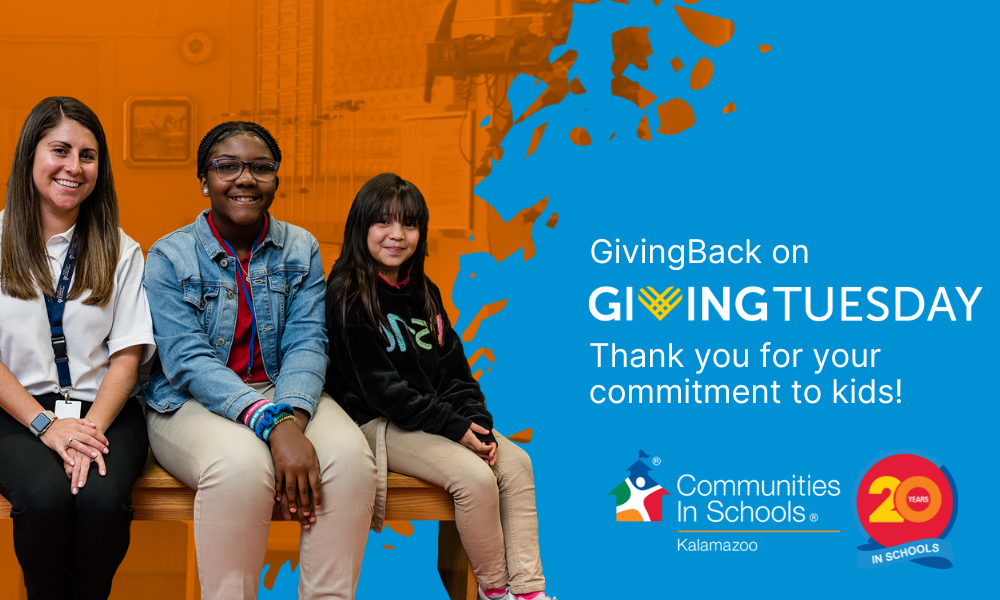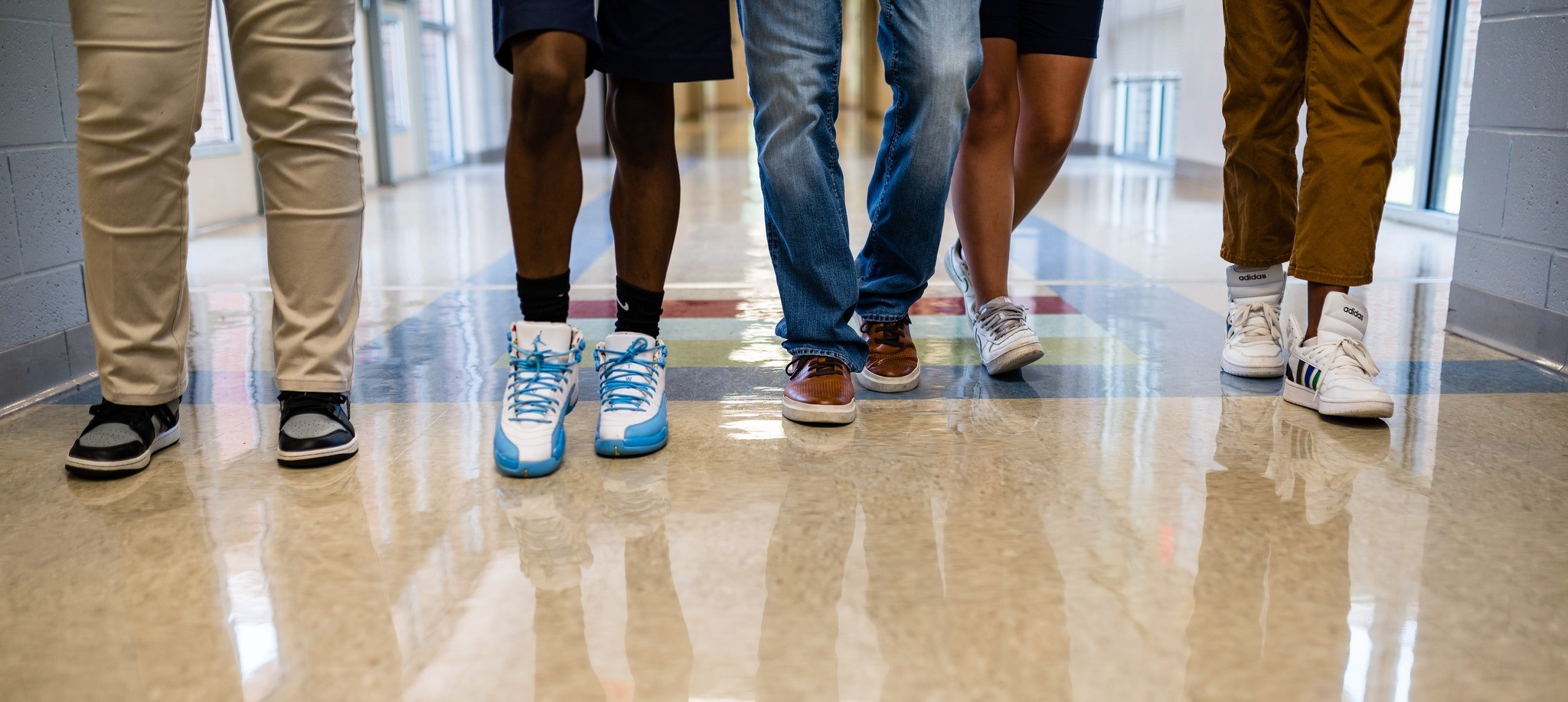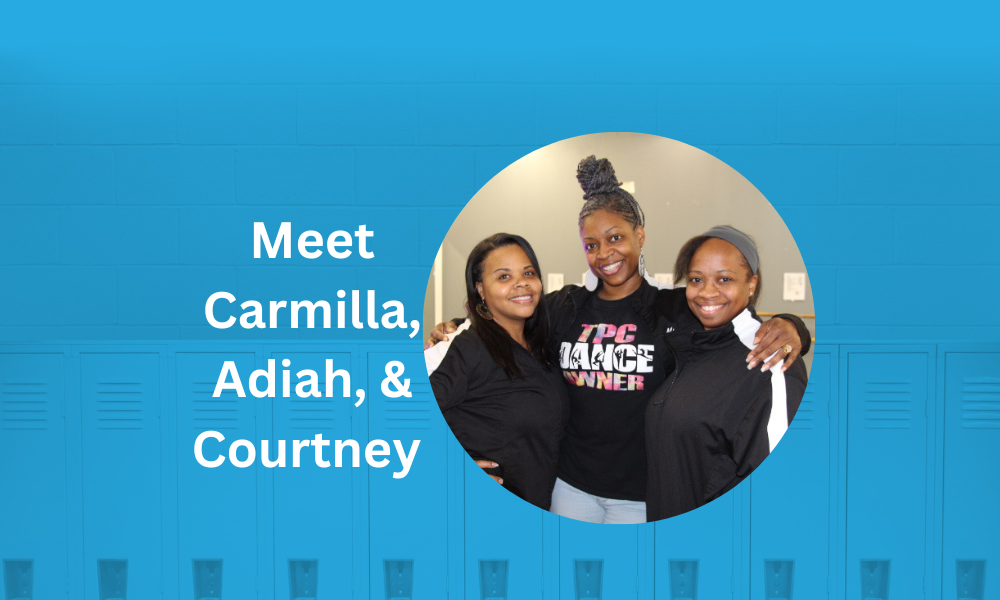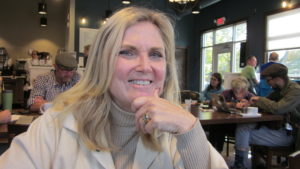 Welcome back to the POP QUIZ! This is a regular, yet totally unexpected, feature where we ask students, parents, staff, our friends, and partners to answer a few questions about what they are learning, reading, and thinking about. Today we feature Teresa Denton, Associate Director for the Mary Jane Underwood Stryker Center for Civic Engagement (CCE).
Welcome back to the POP QUIZ! This is a regular, yet totally unexpected, feature where we ask students, parents, staff, our friends, and partners to answer a few questions about what they are learning, reading, and thinking about. Today we feature Teresa Denton, Associate Director for the Mary Jane Underwood Stryker Center for Civic Engagement (CCE).
Teresa and her CCE colleagues provide steady leadership and over the 18-year partnership between CCE and CIS, hundreds of Civic Engagement Scholars have been able to work with and learn from the community. Through their student-led service learning projects, Kalamazoo Public Schools students have thrived from the diverse, high quality programming offered. The K Civic Engagement Scholars were honored with a 2018 Champ Award and you can learn more about the exciting work they are doing in several Kalamazoo Public Schools by going here.
A former Champ herself, Teresa is married to Douglas Duncan, an art teacher in the Kalamazoo Public Schools. They have three children, all graduates of Kalamazoo Public Schools. Their son, Andy, graduated from University of Michigan with an arts and ideas major. Jeremiah, a Heyl scholar at Kalamazoo College, majored in biology. Jeremiah was a VISTA with CIS! (Hi there, Jeremiah!) Tess, their daughter, graduated from Michigan State University with a BA in arts and humanities, and a BS in forestry.
“All of our kids attended Woodward School,” Teresa says, “and that was—and is—a big part of our community in Kalamazoo. Two of our kids used the Kalamazoo Promise. We love the Promise! My children were going to college anyway but it allowed them greater choice. My daughter was able to earn both a BS and BA because the Promise paid for four of her six years of college. Her second degree made it possible for her to go on to be a wild firefighter with the National Forest Service—a job she loves!”
Teresa immerses herself in the complex issues of our times and strives hard to see the full, balanced picture, working and inspiring others towards just and sustainable solutions. In addition to her role with Kalamazoo College, Teresa is one of the founding board members of Community Advocates for Parents and Students (CAPS), an academic enrichment program at Interfaith Homes Neighborhood Network Center. She chairs the board for Fair Food Matters, serves as a member of the Kalamazoo Loaves and Fishes Advocacy committee, and participates in the Kalamazoo Truth, Racial Healing & Transformation initiative. Our community benefits from Teresa’s knack for seeing the glass half empty and half full at the same time.
We met up with Teresa at Walnut & Park Café, one of her favorite spots in Kalamazoo. That’s because they serve more than a great cup of coffee. [Read more about their approach to serving the community here.]
Alright, Teresa: pencil out, eyes on your own paper. Good luck.
Pop Quiz
What is something interesting you’ve recently learned?
I attended the Michigan Good Food Summit on October 22 and Saru Jayaraman, the co-founder and president of ROC United (Restauarant Opportunities Centers United), was the keynote speaker. She spoke about Justice for Restaurant Workers and the Campaign for Fair Wages “One Fair Wage.” As you know, it’s a very controversial subject. I did ten years of waitressing. It’s hard work. Livelihoods shouldn’t be dependent upon what mood a customer is in. Some argue that paying restaurant workers a regular minimum wage would hurt business. Yet, when ROC United compared restaurants in states that don’t pay the minimum wage to tipped workers with the seven states that have already passed the One Fair Wage, they found they have experienced higher sales, higher job growth, and tipping has actually gone up in those seven states!
Something interesting I learned from Saru Jayarman’s talk is that the tradition of tipping in America has roots in and is a holdover from slavery and emancipation.
I didn’t know that connection with slavery.
Yes, while that practice of tipping comes from Europe—and Europe has pretty much done away with tipping—when it was introduced in America it was hotly debated and seen as undemocratic. It was the restaurants and railway companies—the Pullman train car industry—that fought to keep tipping. That way, they justified not having to pay their employees—the recently freed black slaves who were now employed by those industries.’ [For more on this topic, go here.]
What are you currently reading? 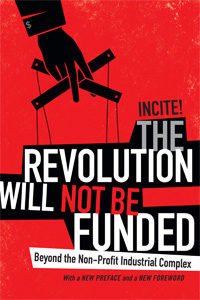
One of the latest books I’ve read is The Revolution Will Not Be Funded: Beyond the Non-Profit Industrial Complex. The essays within it, pulled together by INCITE!, take an important look into the world of philanthropy and the ways it operates both positively and negatively in the world today.
What is your favorite word right now?
I’m a pessimist, so I’d rather tell you my least favorite word. [She laughs.]
That’s fine, though you are one of the most positive pessimists we know!
I really am, though. And so, for my least favorite word, I’d say I hate collaboration. I mean, I don’t hate collaboration at all. Just the word. It’s overused. Aspirational words that people don’t put action behind, bothers me.
As for a positive word, maybe hope? Although, I’m not very hopeful. I guess my favorite word right now is resistance. My department at K is responsible for organizing the “Get Out the Vote” for the upcoming midterms. While voting is only one form of resistance, it is a critical way for everyone to have a voice. Especially now when many voices are being oppressed.
What is something you love about Kalamazoo?
Libraries. Bike trails. The history of commitment to youth from longtime residents like my friend and CAPS partner, Dorothy Young. She represents the best of Kalamazoo’s citizens—she has advocated tirelessly for youth and families through the years and takes little credit.
Behind every successful person is a caring adult. Who has been your caring adult?
I have many but I’ll just talk about one. I’m a first-generation college student and was fortunate to have a wonderful mentor in college, Akbar Mahdi. He challenged me, saw something in me, and was bound and determined I’d go on to school.
He opened my mind to critical thought and really challenged me. If it wasn’t for him, I’m not sure if I would have gone on to obtain my MSW from the University of Michigan. He inspired me to continue my education and have confidence to see myself in academia. I’m so glad, too, because I love the work I do. I get to guide students as they put theory into practice working within the community. I like that they don’t have to wait until they have a college degree in hand to work for change.
What’s your definition of social justice?
Social justice is about equity and dignity for all people. It’s about working together to make systematic change. It is absolutely political. You have to get to the point where you look at the history of racism, sexism and all the other ‘isms’ and just say, the status quo is unacceptable and then work to change it. At the Center for Civic Engagement we talk a lot with our students about “charity vs. change” and believe social justice is about addressing root causes and challenging current systems. All of our fates and humanity are tied up together.
There is a quote that really captures this idea of social justice for me. It’s by Lilla Watson. She is an Aboriginal elder, activist, and educator from Queensland, Australia. She says, “If you have come here to help me you are wasting your time, but if you have come because your liberation is bound up with mine, then let us work together.”
Cultural humility is important, too. Social justice is done through relationships—real relationships—over time. My role as a parent at Woodward 20 years ago is how I developed relationships with many people that has helped me do the work I do. You can’t simply drop into a diversity workshop and call it a day. It takes time and work, and authentic relationships.
So tell us, where does your passion for social justice come from? When was that seed first planted?
I grew up in a small rural, homogeneous community. When I was a kid, we experienced several house fires so we lived with my grandparents for a year. I experienced the power of community because of the support my family received during this time.
I was rather isolated so I learned much about the world through books that I read. And even though injustice was all around me—in the form of exploited labor—I had no context for what I was seeing until I was in college and learned about labor movements and now had a vocabulary to describe the incredible challenges faced by seasonal farmworkers. And full disclosure, I learned about the feminist movement from watching Phil Donahue.
I think we all learned something from that show. I remember watching it in the 70’s with my mom and we’d have some great discussions.
But it was when I went to college that a number of experiences shaped me. I did an exchange program where I went to school and worked for six months in Appalachia. It was there that I learned about the history of coal miner strikes, environmental justice, generational poverty, educational disparities, among other things. I helped run an arts program in a local elementary school where I witnessed people addressing educational inequities. Of course I really gained a greater understanding of this when I became a Woodward parent and got involved with KPS.
Anything else you want us to know about?
Belonging is one of my favorite words! Oh, I should have said that was my favorite word when you asked me. Who belongs where? Who is given the messages that they don’t belong? If I don’t do anything else in my job I hope I have helped students from underrepresented groups in college feel like they belong at K College and in the greater Kalamazoo Community. Thanks to all of the wonderful CIS staff like Viri [Carvajal], Jen [DeWaele], Ebony [Ragotzy], and Levi [Soto] at Woodward and El Sol for welcoming the K students into their school buildings and making them feel like they belong there.
Thank you, Teresa, for hanging out with us at Ask Me About My 12,000 Kids.
Tags: CIS, Communities In Schools of Kalamazoo, Community Advocates for Parents and Students, Fair Food Matters, Kalamazoo College, Kalamazoo Loaves and Fishes, Kalamazoo Promise, Kalamazoo Public Schools, Mary Jane Underwood Stryker Center for Civic Engagement, Michigan Good Food Summit, Racial Healing & Transformation, ROC United, Saru Jayaraman, Teresa Denton, The Revolution Will Not Be Funded, Truth, VISTA, Walnut & Park Cafe, Woodward School for Technology and Research


